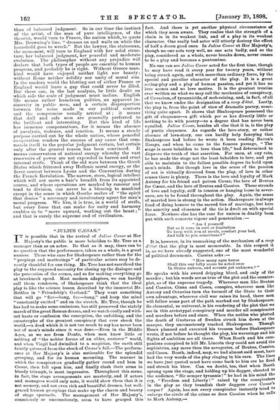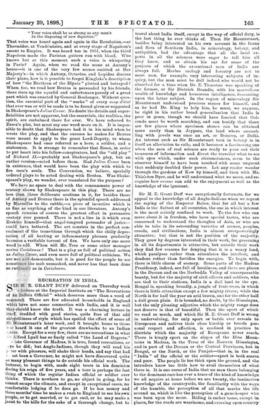" J17LITTS CESAR."
IT is possible that in the revival of Julius Cmar at Her Majesty's the public is more beholden to Mr. Tree as a manager than as an actor. Be that as it may, there can be no question that the performance, taken as a whole, is a great success. Those who care for Shakespeare rather than for the
peepings and mutterings" of particular actors may be de- voutly thankful for one thing. Mr. Tree has not sacrificed the play to the supposed necessity for closing up the dialogue and the procession of the scenes, and so for making everything go at breakneck speed. Most modern adapters, we can hardly call them renderers, of Shakespeare think that the ideal play is like the science lesson described by the immortal Mr. Bottles in "Friendship's Garland." They want something that will go "fizz—bang, fizz—bang," and keep the mind "constantly excited" and on the stretch. Mr. Tree, though he has had•to make some omissions, has still preserved the stately march of the great Roman drama, and we watch coolly and with- out haste or confusion the conception, the unfolding, and the catastrophe of the greatest conspiracy that ever shook the world,—a deed which it is not too much to say has never been out of men's minds since it was done.—Even in the Middle Ages, as we see from Dante, when men knew little or nothing of "the nobler forms of an older, auaterer " world, and when Virgil had dwindled to a magician, the earth still faintly quivered from the shock of Cmsar's fall.—The perform- ance at Her Majesty's is also noticeable for the splendid grouping, and for its human mounting. The manner in which the conspirators gradually gather round and hem in Omar, then fall upon him, and finally clash their arms in bloody triumph, is most impressive. Throughout this scene, In fact, the stage arrangements are masterly, and if actors and managers would only note, it would show them that it is not scenery, and not even rich and beautiful dresses, but well- graced human groupings that make up the charm and beauty of stage spectacle. The management of Her Majesty's, consciously or unconsciously, seem to have grasped this
fact. And there is yet another physical circumstance of which they seem aware. They realise that the strength of a chain is in its weakest link, and of a play in its weakest
character. One really bad actor will utterly destroy the effect of half a dozen good ones. In Julius Cesar at Her Majesty's, though no one acts very well, no one acts badly, and so the play, considered as a whole, never breaks down, never ceases to be a play and becomes a pantomime.
No one can see Julius Cmsar acted for the first time, though he may have read it every year for twenty years, without being struck again, and with more than ordinary force, by the special and peculiar character of the play. It is a great acting-play and a play of human passion, and yet it has no love scenes and no love motive. It is the greatest treatise ever written on what we may call the mechanics of conspiracy, of Cweariam, of tyrannicide, of mob-raising, and, in fact, of all that we know under the designation of a coup d'etat. Lastly, the play is, from the point of view of dramatic poetry, some- thing quite apart. It shows that Shakespeare possessed the
gift of eloquence—a gift which per as has directly little or nothing to do with poetry—to a degree that has never been equalled. Julius Caesar, besides all else that it is, is the play of poetic eloquence. As regards the love-story, or rather absence of love-story, one can hardly help fancying that Shakespeare had before he wrote it been reading Bacon's Essays, and when he came to the famous passage, "The stage is more beholden to love than life," had determined to disprove the truth of that assertion. For once, at any rate, he has made the stage not the least beholden to love, and yet
able to maintain to the fullest possible degree its hold upon men's minds. But though love in the sense of the passion of sex is virtually divorced from the play, of love in other senses there is plenty. There is the love and loyalty of Mark Antony for his friend and patron Caesar, the love of Brutus for Omar, and the love of Brutus and Cassius. These strands of love and loyalty, stiff in tension or hanging loose in sever- ance, are to be found throughout the play. Again, the sense of married love is strong in the action. Shakespeare is always fond of doing honour to the sacred ties of marriage, but here the sanctity and closeness of the tie is dwelt on with special force. Nowhere else has the case for unison in duality been put with such concrete vigour and penetration :—
" Am I yourself
But as it were in sort or limitation To keep with you at meals, comfort your bed, And talk to you sometimes ?"
It is, however, in its unmasking of the mechanism of a coup detal that the play is most memorable. In this respect it is, as we have already suggested, one of the most wonderful of political documents. Cassius asks :— "How many ages hence
Shall this our lofty scene be acted over In States unborn, and accents yet unknown ? "
He speaks with his sword dripping blood, and only of the murder ; but his words are as true of the plot and the counter- plot, as of the supreme tragedy. Wherever men like Brutus and Cassius, Cinna and Caeca, conspire, wherever men like Antony and Octavius turn the turmoil of the State to their own advantage, wherever civil war raises its head, there men will follow some part of the path marked out by Shakespeare. So elemental, so universal, is his rendering of the plot that we see in this archetypal conspiracy and murder all oonspiracies and murders before and since. When the nobles who plotted the death of Gustavus of Sweden struck him down at the masque, they unconsciously tracked Shakespeare. Though Essex planned and executed his treason before Shakespeare wrote, if not before he thought the play, his waverings and his flights of ambition are all there. When Booth and his com- panions conspired to kill Mr. Lincoln they could not avoid the sophistries, any more than the savageries, of Brutus, Cassius, and Caeca. Booth, indeed, may, we had almost said must, have had the very words of the play ringing in his ears. The lines we have just quoted must have come back to him ere he fired I and struck his blow. Can we doubt, too, that when Booth sprang upon the stage, and holding up his dagger, shouted to
the audience, "Sic semper tyrannis ! " he had in his mind the cry, "Freedom and Liberty ! " raised by the conspirators,
in the play as they brandish their daggers over Ctesar corpse P Again, has not every conspirator instantly tried to enlarge the circle of the crime as does Cassias when he calls to Mark Antony,-- " Your voice shall be as strong as any man's In the disposing of new dignities."
'That voice was heard again and again in the Revolution,—at Thermidor, at Vendemiaire, and at every stage of Napoleon's ascent to Empire. It was heard too in 1851, when the third Napoleon made the Parisian gutters ran with blood. Who knows but at this moment such a voice is whispering in Paris? Again, when we read the scene at Antony's house—it is one of the very few scenes omitted at Her Majesty's—in which Antony, Octavius, and Lepidns discuss their plans, how is it possible to forget Kinglake's description of how "the Brethren of the E'lysee " plotted and betrayed? When, too, we read how Brutus is persuaded by his friends, there rises up the squalid and unfortunate parody of a great part which was enacted by General Boulanger. Without ques- tion, the essential part of the " works " of every coup d'etat that ever was or will be made is to be found given or suggested in Shakespeare's Julius Cesar. No doubt the details and super- ficialities are not apparent, but the essentials, the realities, the spirit, are embalmed there for ever. We have referred to Essex's plot, but must say one word more on it. It is impos- sible to doubt that Shakespeare had it in his mind when he wrote the play, and that the excuses he makes for Brutus were meant to apply to the great Lord-Deputy, to whom Shakespeare had once referred as a hero, a soldier, and a statesman. It is strange to remember that Essex, in order to put heart into his fellow-conspirators, had the "old play" of Richard H.—probably not Shakespeare's play, but an earlier version—acted before them. Had Julius Cxsar been in existence, that would have been the play with which to fire men's souls. The Convention, we believe, specially ordered plays to be acted dealing with Brutus. Was Shake- speare's play, we wonder, ever translated for the purpose?
We have no space to deal with the consummate power of oratory shown by Shakespeare in this play. There are no less than three deliberate orations in it, for besides those of Antony and Brutus there is the splendid speech addressed by Marcellhs to the rabble,—a piece of invective which is as fine as anything of the kind in our literature. Antony's speech remains of course the greatest effort in persuasive oratory ever penned. There is not a line in it which even Erskine himself—that angel-tongued persuader of juries— could have bettered. The art consists in the perfect con- cealment of the transitions through which the chilly depre- catiou of all heating or inflammatory phrases gradually becomes a veritable torrent of fire. We have only one more word to add. When will Mr. Tree or some other manager revive Cariolanus ? That is a play as full of political action as Jrulius Czsar, and even more full of political criticism. We are not anti-democratic, but it is good for the people to see sometimts the mob unmasked, and never has that been done so ruthlessly as in Coriolanus.



















































 Previous page
Previous page